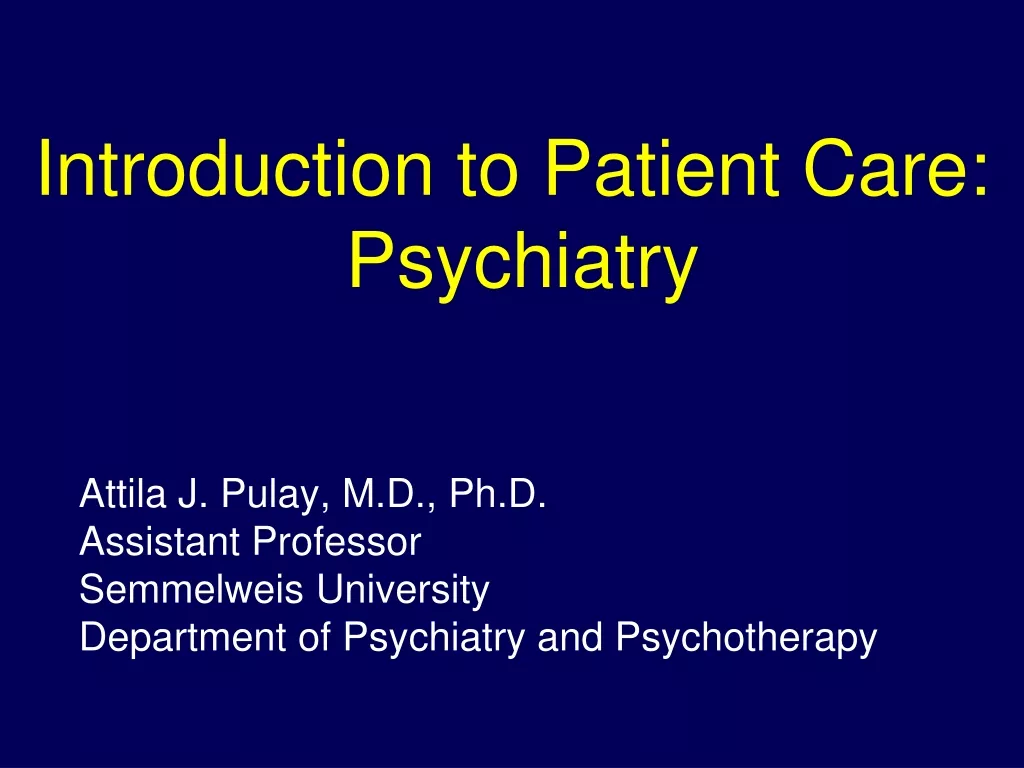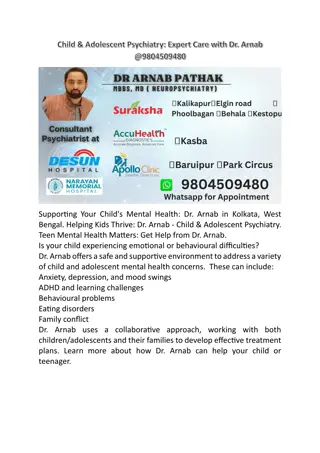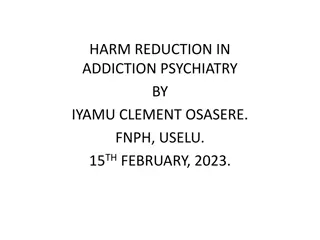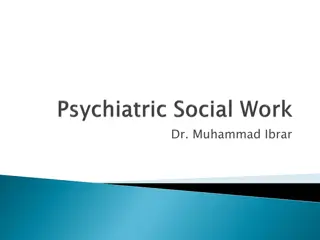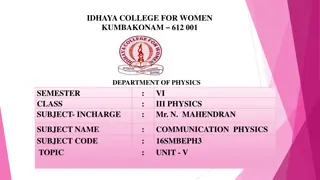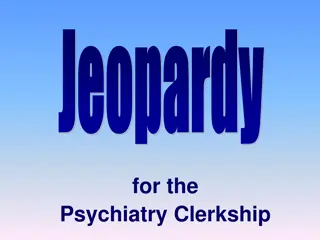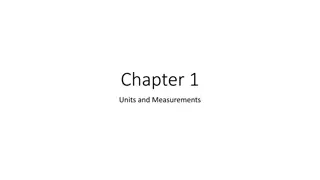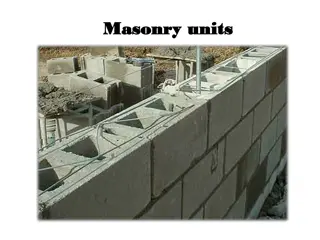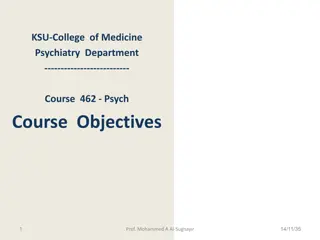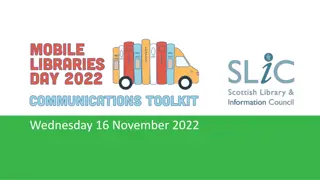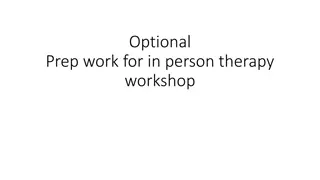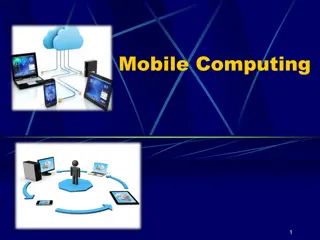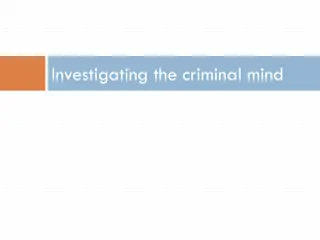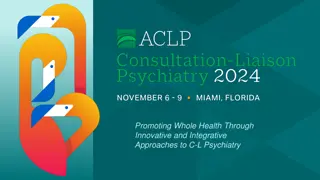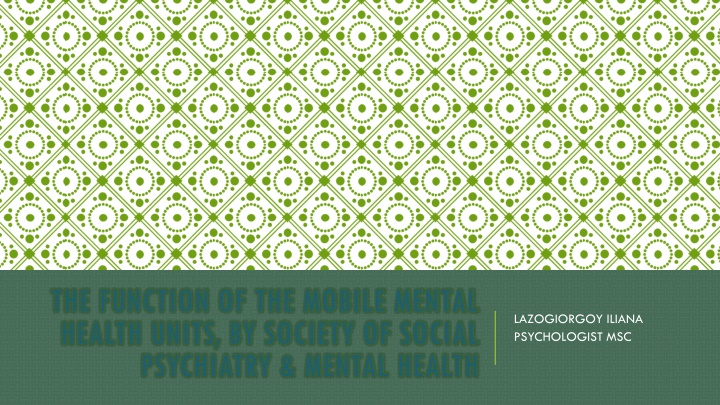
Mobile Mental Health Units in Evros and Fokida: Services and User Demographics
Explore the functions and areas of work of mobile mental health units in Evros and Fokida, including statistics on the number of users and characteristics of people availing the services. Discover the diagnoses and user demographics in Evros, shedding light on the impact of mental health services in these regions.
Download Presentation

Please find below an Image/Link to download the presentation.
The content on the website is provided AS IS for your information and personal use only. It may not be sold, licensed, or shared on other websites without obtaining consent from the author. If you encounter any issues during the download, it is possible that the publisher has removed the file from their server.
You are allowed to download the files provided on this website for personal or commercial use, subject to the condition that they are used lawfully. All files are the property of their respective owners.
The content on the website is provided AS IS for your information and personal use only. It may not be sold, licensed, or shared on other websites without obtaining consent from the author.
E N D
Presentation Transcript
THE FUNCTION OF THE MOBILE MENTAL HEALTH UNITS, BY SOCIETY OF SOCIAL PSYCHIATRY & MENTAL HEALTH LAZOGIORGOY ILIANA PSYCHOLOGIST MSC
AREAS OF WORK: THRAKI & FOKIDA he M.H.U of Thraki prefecture covers the states of Evros (149.354) & Rodopi (112.039). Evros is the north most regional unit, of Greece. The total areas visited by the M.H.U is 6. More precicely, in Rodopi state the M.H.U visits (Sapes - Filira Comotini- Iasmos,), and in Evros state (Soufli-Tihero,Didimotiho, Orestiada & Alexandroupolis).The main area of work is the city of Alexandroupolis . Alexandroypolis (72.959) is the capital city of Evros, it consists of an important port, and commercial center of north-east Greece which is considered sectoralised with multiple mental health services integrated in the primary health care system. The state of Fokida, is situated in middle-central Greece, is a hilly, rural area, it consists of many small towns or villages, mostly mountainous, with a relatively difficult access to the capital cities or to large urban centers like Athens. Fokida has an estimated population of around 48.000 people. The MHU of Fokida visits a total of 11 areas (Amfissa, Itea, Galaxidi,Eratini, Efpalio, Delfi-Chrisso, Gravia- Polydroso, Amfiklia, Lidoriki). The Fokida prefecture has the particularity of the total absence of any other mental health services in the private or public sector.
NUMBER OF PEOPLE USING THE SERVICES YEAR 2015 YEAR 2015 MHU Users Apointments M.H.U users EVROS 1315 EVROS 9.923 FOKIDA 631 FOKIDA 7.731 Total 1.945 Total 17.654 YEAR 2015 M.H.U New Users EVROS 502 FOKIDA 284 Total 786
NUMBER OF USERS AMONG THE AREAS VISITED BY THE M.H.US 1% Evros 1% Fokida 3% 4% Soufli - Tyxero 4% 13% 1% 1% Alexandroupoli 22% Amfiklia Amfissa 1% Galaxidi Sapon - Filiras 28% Desfina 3% Eratini Efpalio Itea Didimotiho 15% Lidoriki Polidroso Xriso - Delphi Orestiada 1% 72% Komotini - Iasmos 30%
CHARACTERISTICS OF THE PEOPLE USING THE SERVICES Fokida Evros Male 33% Male 39% Female 61% Female 67%
EVROS diagnoses ICD10 F00-F09 Organic, including symptomatic, mental disorders F10-F19 Mental and behavioural disorders due to psychoactive substance use 1% 0% 0% 3% 2% F20-F29 Schizophrenia, schizotypal and delusional disorders 2% 5% 9% F30-F39 Mood [affective] disorders 0% 4% F40-F48 Neurotic, stress-related and somatoform disorders F50-F59 Behavioural syndromes associated with physiological disturbances and physical factors F60-F69 Disorders of adult personality and behaviour 23% F70-F79 Mental retardation F80-F89 Disorders of psychological development F90-F98 Behavioural and emotional disorders with onset usually occurring in childhood and adolescence 52% Missing Data
FOKIDA FOKIDA Diagnoses Diagnoses F00-F09 Organic, including symptomatic, mental disorders F10-F19 Mental and behavioural disorders due to psychoactive substance use 0% F20-F29 Schizophrenia, schizotypal and delusional disorders 4% 7% F30-F39 Mood [affective] disorders F40-F48 Neurotic, stress-related and somatoform disorders 25% F60-F69 Disorders of adult personality and behaviour 23% F70-F79 Mental retardation 1% F80-F89 Disorders of psychological development 6% F90-F98 Behavioural and emotional disorders with onset usually occurring in childhood and adolescence F99 Unspecified mental disorder 7% 16% 7% Missing Data 2% 2%
BASIC PRINCIPLES OF WORK Prevention-promotion of mental health in the general population psychiatric care of people with mild and severe mental health problems who are at risk of homelessness, psychiatric crisis and hospitalization. early diagnosis and treatment, prompt and valid intervention in children adult and families who suffer from mental health problems. Prompt intervention in first episode of psychosis, and in psychosis relapses Stabilization of people with psychosis-continuity of care- elimination of crisis episodes, exclusion of hospitalization Psychosocial support and Rehabilitation, Work Integration processes sensitization and education of people about mental health issues.
SERVICES PROVIDED Diagnosis psychiatric treatment, medical treatment, follow-up of chronic psychotic individuals, children and adult psychotherapy, psychosocial rehabilitation, support of daily functions speech evaluation and therapy, art therapy, Drama therapy Learning & language disabilities treatment prompt intervention in psychiatric crisis, in the community Support during individuals psychiatric hospitalization Work with community- social networks
THE MULTIDISCIPLINARY TEAMS Adult and Child Psychiatrists Adult and Child Psychologists Social Workers Art therapist Speech & language therapist Drama therapist Nurse
CONTINUITY OF CARE Basic elements of work: psychiatric care of people suffering from severe mental health disorders such as schizophrenia. follow up treatment: psychological support, psychiatric care, family support, psychosocial rehabilitation, art therapy. Basic aims stable clinical condition avoidance of relapses good function in everyday life, and to being able to regain work. Basic tool: good trusting relationship with the patient & family
PROMPT INTERVENTION IN PSYCHOSIS Prompt and acute intervention in psychotic individuals relapses either fist episode or repetition of episodes. psychiatric care in the patients home: Release of psychotic stress Encouragement of accountability and self involvement. Alteration of negative feelings and attitudes. Intervention in cases of psychiatric hospitalization
PSYCHOSOCIAL REHABILITATION & VOCATIONAL TRAINING programs of vocational training and psychosocial support for users. . The procedure involves particular steps: the use of tools (structured interviews or questionnaires). selection of the particular vocation Visitation program in the selected work. Cooperation with the job instructor . Provision of individual training Evaluation and assessment of the work progress
PSYCHOSOCIAL REHABILITATION AND VOCATIONAL TRAINING social cooperatives-social firms (KOISPE VOLIKAS) Community Sensitisation Programmes Groups of empowerment
THE COMMUNITY FACTOR ACTION RESEARCH TRAINING SECTOR COMMUNITY SECTOR CLINICAL SECTOR
WORKING WITH THE COMMUNITY Basic aim: sensitization, education of population and anti-stigmatizing of mental health problems. wide variety of activities: seminars towards specific target groups, public speeches , tutorials, social forums, articles in public press etc. development of social networks: umbrella body of public and private social institutions Continuous focus on training specific target groups in mental health issues. M.H.U in Fokida: a Network called AKESO Network of Coordination and Cooperation of institutions around public health issues.
WORKING WITH THE COMMUNITY close collaboration with local authorities, health professionals and social services. small communities: local key figures: mayor, the doctor, the pharmacist, the priest, the police, We are trying to get people to know and connect to the work being done. We are gaining the commitment of influential local individuals and groups. We are trying to mobilize available human recourses We are trying to alter peoples negative attitudes towards mental health issues, by giving paradigms of positive behaviors, correcting myths and misconceptions working with primary and secondary schools.

